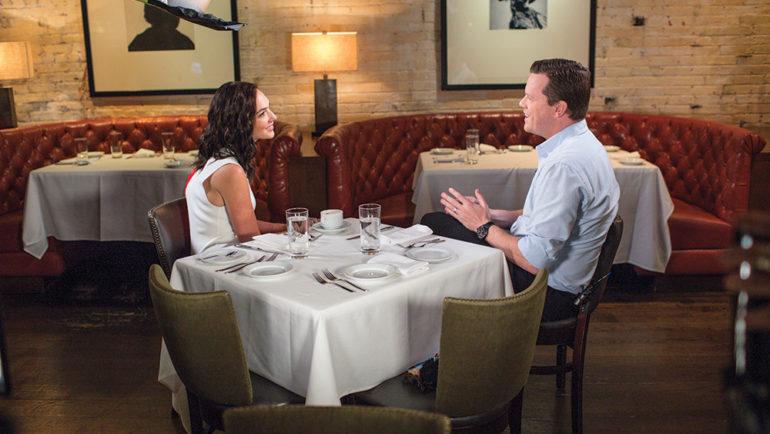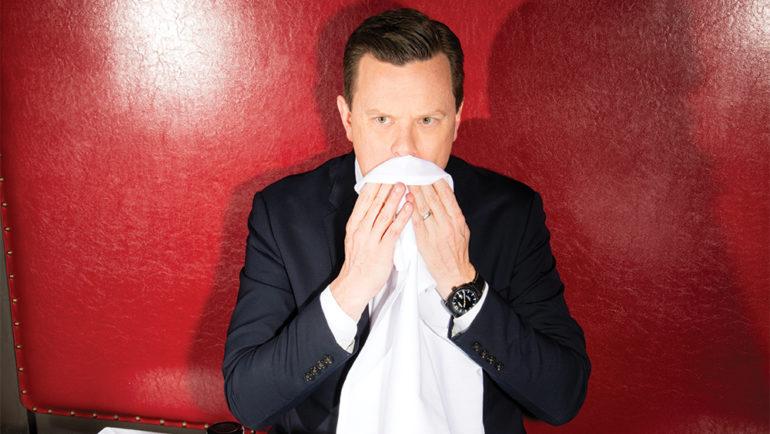Willie Geist Juggles Morning Scoops and Sunday Sit-Downs — and Isn’t Letting Up
By Brian Steinberg
LOS ANGELES (Variety.com) – Willie Geist, one of TV’s early-morning regulars, knew he was in for a dangerously late night.
Though he rises at 4 a.m. on most days, the and anchor has served as master of ceremonies for the annual National Board of Review awards for the past few years. And so there he was, hunkered backstage at New York’s glitzy Cipriani 42nd Street on Jan. 8, socializing with dozens of A-listers who strolled in to hand out trophies. There was Richard Gere one moment, Sophia Bush another, and then Trevor Noah. All the while, Geist knew the event was going to keep him out well past the 9 p.m. curfew he regularly sets for himself. He wouldn’t get the six hours of sleep he requires to manage his daily a.m. duties as co-host of MSNBC’s “Morning Joe.”
“Typically insane” is how Geist, 43, describes his schedule on this night and many others.
Though it pays for him to occasionally be a night crawler, he is best known for being on TV at daybreak. While continuing his role at “Joe,” Geist has been building a distinctive edition of the Sunday-morning edition of NBC’s “Today.” The show is less focused on the Trump-heavy news cycle and instead centers on lengthy sit-downs (eight to nine minutes) with an of-the-moment artist or newsmaker. The conversations typically take place across an hour and are released uncut by NBC News in podcast form.
“In TV time, that is just excruciatingly, beautifully long,” says Geist as he sits in his small office (heavily stocked with Kind energy bars) at NBC News’ 30 Rock headquarters just as he begins to write the script for one of his “Sunday ” outings.
He thinks the interviews help the show stand apart. Most newsmakers come to a TV broadcast for a quick-hit conversation. But Geist wants to work harder for something viewers haven’t heard before. “If I get the first 10 or 15 minutes for them to trust me, it’s going to be OK for them to give me a deeper answer, a more thoughtful answer, a longer answer,” he says.
NBC News isn’t producing “Sunday Today” just to promote the art of conversation. Executives see the show as a way to compete with a Sunday institution: “CBS Sunday Morning.” The hope is that Geist can draw a younger demographic than the CBS stalwart, which is hosted by Jane Pauley.
The Geist-led revamp of “Sunday Today” launched in April 2016, not long after “CBS Sunday Morning” signaled changes ahead when then-anchor Charles Osgood had to take time off for knee surgery. NBC’s move was prescient: Geist’s Sunday debut preceded by five months the “Sunday Morning” hand-off from Osgood to Pauley. The CBS program hasn’t faltered, still drawing more viewers than either of its competitors on NBC or ABC. But Geist is key to creating a younger audience for Sunday fare, says Noah Oppenheim, president of NBC News. “There’s no question that ‘CBS Sunday Morning’ is an institution, regardless of who is anchoring it,” he says, but “we think Willie is tapping into a slightly younger sensibility.”
Geist is building on a unique family tradition. His father, former New York Times columnist Bill Geist, was a “CBS Sunday Morning” correspondent for 31 years before retiring last year. Bill Geist used to bring his son to the “Sunday Morning” set, and the younger Geist remembers watching original host Charles Kuralt smoke a cigarette during commercial breaks (Geist does a pretty good impression of Kuralt too).
Of his father, from whom he inherited “a complete curiosity” and a love for writing, Geist says, “He doesn’t think of himself as a TV guy — they just followed him with cameras when he did a story, you know?”
The weekend program means Geist’s work schedule is no month of Sundays. He must keep up on current events for his role at “,” and he sometimes fills in on weekday broadcasts of “Today.” And then there’s the scramble to book and meet guests for the longer-form Sunday interviews. On one recent morning, Geist led “Morning Joe” for its full three hours, with Joe Scarborough and Mika Brzezinski off for the day. Once 9 a.m. hit, he paused to say a few words to regular MSNBC contributor Donny Deutsch before leaving the set, then rushed to change outfits before interviewing “A Star Is Born” actor-director Bradley Cooper.
A significant break came when he lucked into an interview with Bill Murray in early 2018 — one his staff assumed he wouldn’t get because the actor didn’t respond to a request left for him on the 800 number he famously maintains to field publicity queries.
“We called and we never heard back from him,” Geist recalls. “He came into ‘Today’ to do a live interview with Savannah [Guthrie] at 7 a.m. on a Tuesday. He was working the room and said to our group of bookers, ‘I want to do that show. I want to do that. Have him come by the hotel tomorrow.’ That was by virtue of people he knows telling him they’ve seen some of the interviews. We showed up at 10 a.m.”
The longer format with a guest like Murray paid off. The actor needed time to warm up before he was ready to dish. “For about 10 to 11 minutes, he was feeling me out, and then he’s telling me about the time he and Keith Richards are passing a bottle of Rebel Yell back and forth in the ‘SNL’ bathroom,” Geist says. A representative of Jerry Seinfeld saw the interview and, based on the exchange, offered the comedian for another segment. That was an important moment for Geist. “To have someone who doesn’t need to do a lot of press — that was a big one for us,” he says.
| Geist’s “Today” interview with Gal Gadot was held at a local restaurant. He likes the informal vibe of talking with subjects away from the set. Mike Smith |
Geist has rules about the interviews: He prefers to break the ones that typically govern the TV news format. “A TV interview is inherently an unnatural thing. You never sit down or wait for all the lights and a countdown and the camera to be set and everyone to be quiet and say, ‘Go,’ when you start talking to a person. So how do you get around that?” He makes sure to meet his subjects in a bar or restaurant. And he doesn’t bring a list of questions. “There is no way you would bring a pile of notes if you met somebody in a bar,” he says.
At least one of his interviewees appreciates the effort. “I don’t know what sort of black magic he’s messing with, but he makes his guests feel incredibly safe,” says Ryan Reynolds, who sat down with Geist to discuss his big-screen roles and his investment in the liquor company Aviation Gin in an October broadcast. “Like you can open up and tell him anything. On camera, he’s welcoming, curious and easy to speak with.”
Geist got his start as a producer and reporter covering sports for CNN, and found his way to morning hours on MSNBC in the aftermath of Don Imus’ radio simulcast being taken off the air in 2007. Soon he was the official co-host of “Morning Joe,” and he has become as integral a part of the program as Brzezinski and Scarborough. But he has striven to find ways to showcase his writer’s voice. In 2009, he went to MSNBC chief Phil Griffin and asked if he could do something on his own as a warmup for “Morning Joe.” The response? “You can have 5:30 a.m., and you can’t have any staff,” Geist recalls. “I said, ‘I’ll take it.’ I think he was maybe surprised that I took it immediately, but to me, all these things lead to others.”
He writes the bulk of the Sunday program himself, from the news items to the intros to segments involving other reporters. “He’s one of the best ad-libbers I’ve ever run across,” says Guthrie. “Even if it’s on the prompter, he veers off the script to make it more conversational.”
Some at NBC News have broader ambitions for Geist’s Sunday show. Everyone wants to continue to land high-profile guests, including prominent figures in business, technology and politics, says Matthew Carluccio, executive producer of the weekend “Today” broadcasts. Among the big swings on Geist’s wish list are Beyoncé and Jay-Z, Oprah Winfrey, and Mick Jagger and Keith Richards. Carluccio says he’d like to expand the show. “It’s an hour format, and an hour goes quickly, but those are decisions that are above my pay grade.”
A larger question may be whether Geist can find more hours in the day for anchor duties. When he landed “Sunday Today,” he took his wife, Christina, on a ski trip and told her he was being given a new opportunity — on top of everything else he was doing. Her support is key, he says, but admits that sometimes she asks, “Why are we going to bed at 9 p.m. on Saturday night again? What happened to our social life?”
The anchor hopes to continue working both the daily news cycle and the Sunday newsmagazine. “I’m an add-to-the-plate kind of guy,” Geist says. “I don’t have to choose, and so I won’t until they force me to.”


